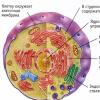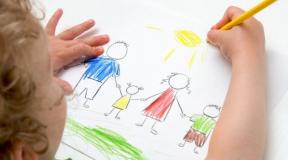According to the convention on the rights of the child, a child is. Convention on the Rights of the Child: Basic Principles. Federal legislation and by-laws of the Russian Federation in the development of the Convention
Plan:
1. Convention on the Rights of the Child
2. General provisions of the Convention on the Rights of the Child
1. Convention on the Rights of the Child is the first officially approved international document that includes a complete list of human rights: civil and political rights along with economic, social rights, which emphasizes their importance equally.
The Convention on the Rights of the Child was unanimously approved by the UN General Assembly November 20, 1989. At present, it has been ratified by all states of the world with the exception of two: the United States and Somalia.
Convention defines child as a human being until the age of 18, unless, under the law applicable to the child, he reaches the age of majority earlier.
The Convention establishes the necessary legal and moral standards for the protection of the rights of the child and does not preclude any measures to improve the rights of the child, enshrined in state treaties. The states parties to the Convention bear official and moral obligations to realize the rights of the child through administrative, legislative, legal and other measures to implement the Convention.
Basic principles of the Convention
2. The best interests of the child.
3. The right to life, survival and development.
4. Respect for the views of the child.
The main idea of the Convention is the best interests of the child. The provisions of the Convention boil down to four basic requirements that should ensure the rights of children: survival, development, protection and active participation in society.
The Convention affirms a number of important social legal principles. The main one is the recognition of the child as a full-fledged and full-fledged personality. It is a recognition that children should have human rights in their own right and not as an appendage of their parents and other guardians.
Recognizing the child as an independent subject of law, the Convention covers the whole range of civil, political, economic, social and cultural rights. At the same time, she emphasizes that the exercise of one right is inseparable from the exercise of others. It proclaims the priority of the interests of children over the needs of the state, society, religion, and family.
The Convention states that the freedom necessary for the child to develop his or her intellectual, moral and spiritual abilities requires not only a healthy and safe environment, an adequate level of health care, the provision of minimum standards of food, clothing and housing, but also the provision of all these first and foremost, at all times. in priority order, children.
The main provisions of the Convention include:
Every child has the inalienable right to life, and States shall ensure, to the greatest extent possible, the survival and development of the child.
Every child has the right to a name and a nationality from the moment of birth.
In all actions of the courts, social welfare institutions, administrative bodies dealing with children's problems, the best interests of the child are the primary consideration.
States shall ensure that every child enjoys all rights without any discrimination or distinction.
Children should not be separated from their parents unless this is done by the competent authorities in the interests of their well-being.
States should facilitate family reunification by allowing entry into or exit from their territory.
Parents have the primary responsibility for the upbringing of the child, but States must provide them with adequate assistance and develop a network of childcare facilities.
States must ensure that children are protected from physical or psychological harm and abuse, including sexual abuse or exploitation.
States shall provide suitable substitute care for children who have no parents. The adoption process is carefully regulated and international agreements should be sought to provide guarantees and legal validity in cases where adopters intend to remove a child from the country of birth.
Children with special needs, including children without one or both parents, deprived of guardianship, street children, children with physical or mental disabilities have the right to special treatment, education and care.
The child has the right to enjoy the most advanced health care services. The State must ensure the health of all children, giving priority to preventive measures, health education and the reduction of child mortality.
Primary education should be free and compulsory.
School discipline must be maintained in a manner that reflects respect for the human dignity of the child. Education should prepare the child for a life of peace and tolerance.
Children should have time for rest, play and the same opportunities to engage in cultural and creative activities.
States must ensure that the child is protected from economic exploitation and work that may interfere with education or be detrimental to his health and well-being.
States must protect children from illicit drug use and participation in drug production or trafficking.
The death penalty or life imprisonment is not imposed for crimes committed by persons under the age of 18.
Children should be detained separately from adults; they must not be subjected to torture or cruel and degrading treatment.
No child under 15 years of age shall take any part in hostilities; children affected by armed conflict are under special protection.
Children from national (ethnic) minorities and the indigenous population should freely use the property of their own culture and mother tongue.
Children who have been ill-treated, abused, detained or neglected must receive appropriate treatment or training for their recovery and rehabilitation.
Children who become involved in violations of the criminal law must be treated in a manner that promotes their sense of dignity and worth and to facilitate their reintegration into society.
States should widely inform both adults and children about the rights contained in the Convention.
EVERY CHILD HAS THE RIGHT...
Summary of the Convention on the Rights of the Child
Convention is an international legal
a document recognizing all human rights in relation to children from 0 to 18 years.
The convention was adopted on November 20, 1989.
On the territory of our country
Convention on the Rights of the Child
entered into force
September 15, 1990.
This means that our state
must comply with all provisions of this Convention.
Article 1
Definition of a child
Every person under the age of 18 is considered, in accordance with the law of his country, a child and has all the rights contained in this Convention.
Article 2
Prevention of discrimination
Every child, regardless of race, colour, sex, language, religion, wealth or social origin, has all the rights provided for in this Convention. Nobody should be discriminated against.
Article 3
The best interests of the child
The state, when making decisions, must ensure the best interests of the child and provide children with special protection and care.
Article 4
Exercise of rights
The state must do everything possible to implement all the rights of the child recognized by this
Convention
Article 5
Family upbringing and child development
The state must respect the rights, obligations and responsibilities of parents in raising a child, taking into account his development.
Article 6
Right to life, survival and development
Every child has the right to life and the state is obliged to ensure the survival and healthy development of the child, maintaining his mental, emotional, mental, social and cultural level.
Article 7
Name and citizenship
Every child has the right to a name and nationality at birth, and the right to know and be cared for by their parents.
Article 8
Preservation of individuality
The state must respect the right of the child to retain his or her identity, including name, citizenship and family ties, and must assist the child in the event of their being deprived.
Article 9
Separation from parents
A child should not be separated from his parents, except in cases where this is done in his interests.
For example, when parents do not take care of the child or treat him cruelly. If a child is separated from one or both parents, he has the right to meet with them regularly (Except when it is contrary to his interests). If a. As a result of a State decision, a child is separated from one or both parents, then the State must provide all necessary information about the whereabouts of his parents (except in cases where this could harm the child).
Article 10
Family reunification
If the child and his parents live in different countries, then they should all be able to cross the borders of these countries and enter their own in order to maintain personal relations
Article 11
Illegal movement and return
The state must prevent the illegal export of children from the country.
Article 12
The views of a child
The child, in accordance with his age and maturity, has the right to freely express his views on all matters affecting him. To this end, it may be heard at any judicial or administrative session.
Article 13
Freedom of expression
The child has the right to freely express his opinion, seek, receive and transmit information of any kind, unless it harms other people, does not violate state security and public order.
Article 14
Freedom of thought, conscience and religion
The state must respect the child's right to freedom of thought, conscience and religion. Parents or guardians of the child must explain this right to him.
Article 15
Freedom of Association
Children have the right to meet and associate in groups, as long as it does not harm other people and does not violate public safety and order.
Article 16
Protection of the right to privacy
Every child has the right to privacy. No one has the right to harm his reputation, as well as enter his house and read his letters without permission. The child has the right to be protected from unlawful attacks on his honor and reputation.
Article 17
Access to relevant information
Every child has the right to access information. The state should encourage the media to disseminate materials that contribute to the spiritual and cultural development of children, and prohibit information that is harmful to the child.
Article 18
Parental Responsibility
Parents are equally responsible for the upbringing and development of the child. The state must provide parents with adequate assistance in the upbringing and development of children, as well as ensure the development of a network of children's institutions.
Article 19
Protection against abuse and negligence
The state must protect the child from all types of violence, neglect
and maltreatment by parents or others, as well as helping the child,
abused by adults.
Article 20
Protection of a child deprived of a family
If a child is deprived of his family, then he has the right to rely on special protection and assistance.
from the side of the state. The state can transfer the child to the upbringing of those people
who respect his native language, religion and culture.
Article 21
Adoption
The state must ensure that, when adopting a child, it is strictly
his best interests are respected and his legal rights are guaranteed.
When adopting a child, both within the country and abroad,
the same rules, guarantees and norms.
Article 22
Refugee children
The state should provide special protection to refugee children - to provide
assistance to them in obtaining information, humanitarian aid and assistance
family reunion.
Article 23
Disabled children
Every child who is mentally or physically handicapped
has the right to special care and a decent life.
The state should provide such a child with the opportunity to study, be treated,
prepare for work, relax, be as independent as possible, that is, live a full life
Article 24
Health and healthcare
Every child has the right to protect their health: to receive medical care,
clean drinking water and good nutrition.
States must ensure that child mortality is reduced
and conduct health awareness campaigns.
Article 25
Periodic Care Evaluation
The state should regularly check the living conditions of a child in care.
Article 26
Social Security
Every child has the right to enjoy social benefits, including social insurance.
Article 27
Standard of living
Every child has the right to a standard of living adequate for his physical,
mental, and spiritual and moral development.
The state should help those parents who cannot provide
necessary living conditions for their children.
Article 28
Education
Every child has the right to education. Elementary education
should be compulsory and free, secondary and higher - accessible to all children.
Schools must respect the rights of the child and show respect
to his human dignity.
The state should monitor the regular attendance of children in schools.
Article 29
Educational goals
Educational institutions should develop the personality of the child, his talents,
mental and physical abilities, as well as to educate him in the spirit of understanding,
peace, tolerance, cultural traditions, respect for their parents.
Article 30
Minority and Indigenous Children
If the child belongs to an ethnic, religious or linguistic minority,
he has the right to speak his native language and observe native customs,
practice one's religion
Article 31
Recreation, leisure and cultural life
Every child has the right to rest and play, as well as to participate in cultural
and creative life.
Article 32
Child labour
The state must protect the child from dangerous, harmful and overwork.
Work should not interfere with education and spiritual and physical
child development.
Article 33
Illicit drug use
The state must do everything possible to protect children from illegal
use of drugs and psychotropic substances, to prevent the participation of children
in the production and trade of drugs.
Article 34
Sexual exploitation
The state must protect children from any form of sexual abuse.
Article 35
Trade, smuggling and kidnapping
The state must fight with all its might against the kidnapping, smuggling and sale of children.
Article 36
Other forms of exploitation
The state must protect the child from any action that may harm him.
Article 37
Torture and imprisonment
The State shall ensure that no child is subjected to torture,
ill-treatment, illegal arrest and imprisonment.
Every child deprived of liberty has the right to maintain contact with his
family, receive legal assistance and seek protection in court.
Article 38
Armed conflicts
The state should not allow children under the age of 15 to join the army or directly
participate in hostilities.
Children in conflict zones should receive special protection and care.
Article 39
Restorative care
If a child is a victim of abuse, conflict, torture, neglect or exploitation,
then the state must do everything possible to restore his health and restore his sense of
own dignity.
Article 40
Administration of justice for juvenile offenders
Every child accused of breaking the law is entitled to basic guarantees,
legal and other assistance.
Article 41
Application of the highest standards
If the legislation of a particular country protects the rights of the child better,
than this Convention, the laws of that country shall apply.
Article 42
Compliance and entry into force
The state should disseminate information about the Convention among adults and children.
Articles 43-54
concern how adults and states
should work together to ensure all the rights of children.
Full text of the Convention on the Rights of the Child
can be found on the website
United Nations Children's Fund UNICEF:
www.unicef.ru
and the website of the Association of Commissioners for Children's Rights in the Russian Federation: www.ombudsmandeti.ru
The UN Convention on the Rights of the Child was adopted by a resolution of the General Assembly on November 20, 1989. It entered into force on September 2, 1990.
The General Assembly proclaims this Declaration on the Rights of the Child for the purpose of securing a happy childhood and the enjoyment, for their own benefit of society, of the rights and freedoms herein provided, and urges parents,<...>that they recognize and strive to respect these rights...
Principle 1. The child should have all the rights set out in this Declaration. These rights must be recognized for all children, without exception and without distinction or discrimination based on race, colour, sex, language, religion, political or other opinion, national or social origin, property, birth or other status relating to the child or his families.
Principle 2: The child shall be accorded special protection, by law and by other means, and provided with opportunities and facilities which will enable him to develop physically, mentally, morally, spiritually and socially in a healthy and normal manner. In legislating for this purpose, the best interests of the child should be the primary consideration.
Principle 3. From birth, the child should have the right to a name and a nationality.
Principle 4. The child should enjoy the benefits of social security. He should have the right to healthy growth and development. To this end, special care and protection must be provided to both him and his mother, including adequate prenatal and postnatal care. The child should have the right to adequate food, housing and medical care.
Principle 5. A child who is physically, mentally or socially handicapped must be provided with the special treatment, education and care necessary in view of his special development.
Principle 6. For the full and harmonious development of his personality, a child needs love and understanding. He should, whenever possible, grow up in the care and responsibility of his parents, and in any case in an atmosphere of love and moral and material security. A minor child shall not, except in exceptional circumstances, be separated from his mother. Society and public authorities should be obliged to take special care of children who do not have a family and children who do not have sufficient means of subsistence. It is desirable that families with many children be provided with state or other allowances for the maintenance of children.
Principle 7. The child has the right to education, which should be free and compulsory, at least in the initial stages. He must be given an education which is in keeping with his general cultural development and which will enable him, on the basis of equality of opportunity, to develop his faculties and personal judgment, as well as a sense of moral and social responsibility, and become a useful member of society.
The best interests of the child should be the guiding principle for those who have the responsibility for his education and training, this responsibility lies primarily with the parents.
The child should be provided with a full opportunity for games and entertainment that would be directed to the goals pursued by education. Society and public authorities must make efforts to promote the implementation of this right.
Principle 8. The child must be protected from all forms of neglect, cruelty, exploitation. It must not be traded in any form.
Principle 9. A child should not be recruited until the appropriate minimum age has been reached. In no case shall he be entrusted or permitted to do any work or occupation which would be injurious to his health or education or hinder his physical, mental or moral development.
Principle 10: The child must be protected from practices that may encourage racial, religious or any other form of discrimination. He must be brought up in the spirit of mutual understanding, tolerance, friendship among peoples, peace and universal brotherhood, and also in the full consciousness that his energy and abilities should be devoted to the service for the benefit of other people.
The Convention on the Rights of the Child, in short, contains everything about the rights of the child. The main document of international law concerning the rights of children is the UN Convention on the Rights of the Child. All countries that have acceded to the Convention apply to it if controversial issues arise in the protection of the interests of children, or if a specific case is not provided for in the legislation of the country. The word "convention" means "international treaty". This treaty covers all the possible rights that countries should provide to children growing up in them.
The treaty was adopted in 1989 by the UN General Assembly. Work on it has been carried out since 1979, when professor of international relations from Poland A. Lopatka proposed a draft Convention. Before that, there was the Declaration of the Rights of the Child, which was adopted by the UN in 1959. It emphasized 10 provisions, which said that those responsible for raising children are obliged to give the best to children and act for their good.
By September 2, 1990, the treaty was signed by twenty countries, and from that day it entered into force. As of November 2014, when the latest amendment to protect children from pornography was made, 169 countries were parties to the Convention. Today it is the most comprehensive international document that stipulates the rights of the child and their protection.
Convention on the Rights of the Child, articles
The Convention on the Rights of the Child includes 54 articles.
In the first article, any citizen of the state under the age of 18 is recognized as a child, if he was not recognized as having reached the age of majority earlier according to the laws of his country. The articles list the rights of the child to:

Convention on the Protection of the Rights of the Child
Protection of the rights of the child should be carried out by the state, parents, other people who have received the authority to be their defenders.
Every child in a country party to the Convention has the right to protection:
- from all types of violence;
- from the exploitation of the labor of children if it interferes with their development and education;
- from the use or distribution of drugs;
- from kidnapping, as well as from child trafficking;
- from cruel punishments;
- for protection in the commission of crimes. In accordance with the treaty, children cannot be condemned to death, as well as to imprisonment for life;
- for protection during the war. Participation in the war is possible only after 18 years;
- information harmful to the development of the child.
The Convention points to the need to combat child mortality, disease, to provide assistance to mothers during pregnancy and after the birth of children, and to work on teaching family planning.
To comply with the articles of the Convention, the UN Committee for the Protection of the Rights of the Child is elected every four years, which receives reports of violations of the treaty. The Committee consists of 10 people from among the countries participating in the Convention.
 Reports of violations of children's rights should not be anonymous. When the committee receives such news, it invites the state to take remedial action and submit a report.
Reports of violations of children's rights should not be anonymous. When the committee receives such news, it invites the state to take remedial action and submit a report.
If children are trafficked or involved in war, the Committee should investigate. The country in which the violation occurred is asked for permission for members of the committee to be present and investigate. After the end of the investigation, the authorized member of the committee makes recommendations on the liquidation of the violation and monitors its implementation.
Since 2014, the Committee has also received reports of violations of the rights specified by the Convention directly from children.
Any country participating in the Convention may declare withdrawal at any time, but will cease to be a party to the treaty only after a year.
The Convention on the Rights of the Child briefly formulates all the possible rights of children and the protection of children's interests in articles 1-42, the remaining articles are devoted to the rules for signing and ratifying this treaty.
All states that have become parties to the treaty are required to widely publicize the Convention among the people.
An international document adopted by the UN on November 20, 1989, describes in detail how the rights and freedoms of every little person who has not reached the age of majority should be respected at the level of the state, family, and educational institutions.
Summary of the document
The text is divided into 4 parts. The main provisions of the convention on the rights of the child are the preamble (abstract) and 54 articles, which clearly distinguish and explain what opportunities the state provides to every citizen from birth to 18 years of age. Since the baby cannot defend his own interests, this task is entrusted to parents, guardians or the state.
The UN Convention on the Rights of the Child establishes the following postulates of the law:
- Every minor citizen has equal opportunities regardless of the social or financial status of the family, differences in gender, skin color, nationality, religion and other differences.
- The state and parents must create suitable conditions for children to develop normally in a spiritual, moral, and physical direction. At the same time, legal obligations are not imposed on minors.
- A person, regardless of age, must be a citizen of the country in which he was born. Everyone has the right to have citizenship and a name.
- Determining the right to life, accordingly, it is necessary to provide housing, medical care, education, social security not only to healthy minor members of society, but also to those marked by physical or mental disabilities.
- The kid should be brought up in a family with parents (relatives or adoptive). You can not separate the mother and child, if there are no legal grounds.
- The state must provide little citizens with protection from sexual assault, violence, and cruel treatment by loved ones or strangers.
- Each little person sees the world around him in his own way, and adults must take into account the opinions and desires of minors.
Important! Only adults (parents, guardians or government officials) are responsible for non-compliance with the law.
Articles of the Convention
Articles of the UN Convention are divided into 3 groups:
- The right to services or certain benefits is determined from the very birth of a member of society (a name is given, citizenship is established, medical care and education are provided, state or parental care is shown for disabled children, orphans are taken care of, the required leisure is provided).
- Legal protection is provided against attacks on life, separation from mother and father, labor exploitation, involvement in a criminal network, sexual abuse and other such factors.
- Minors can, according to their awareness, participate in the life around them in order to prepare for the entry and adaptation of adult life.
Document Analysis
 The provisions of the convention begin with a preamble, which retells the entire history of child protection laws, taking into account the development of the culture and traditions of various countries.
The provisions of the convention begin with a preamble, which retells the entire history of child protection laws, taking into account the development of the culture and traditions of various countries.
The concern for the younger generation on the part of the international association of all nations was outlined in the Declaration adopted in 1959.
The document outlined a list of 10 principles that should be followed when taking care of the happy life of our underage fellow citizens. At the same time, the main postulate was that humanity should allocate the best to babies.
A minor spends most of his time surrounded by his parents, so he should be interested in preserving this unit of society. And parents, in turn, instill moral and ethical qualities so that a maturing person becomes a full-fledged citizen of his country.
It is interesting! Minor citizens of the country should know and understand their rights, be able to use them. At the same time, it is necessary to teach the younger generation to respect the rights of the people around them so as not to create conflicts.
 The function of the state apparatus is to provide support to the family so that the requirements for educating the younger generation are smoothly fulfilled. At the same time, protect the younger ones from the negative influence of their parents (alcoholism, abuse).
The function of the state apparatus is to provide support to the family so that the requirements for educating the younger generation are smoothly fulfilled. At the same time, protect the younger ones from the negative influence of their parents (alcoholism, abuse).
Being a unique document, the convention at the international level regulates legal family relations: how the relationship between parents and children should be built.
Characteristics of international law
Briefly characterizing the document as a whole, the following groups of articles should be distinguished:
- article 1 serves as a definition of who is called a child;
- the general principles of the convention are set out in articles 2, 3, 5 and 12;
- the protection of the rights of a minor is covered by articles 6-11 and 13-40;
- the norms for the implementation of the convention within the state are laid down in articles 41-42, 44 and paragraph 6 of the fourth article;
- how to carry out a controlling action say Art. 43-45;
- the final phase is displayed in 46-54 Art.
In European legislation, babies are treated on an equal footing with adults who have civil and political freedoms. But the baby cannot protect himself on his own, so the state and the family must take this problem upon themselves.
What does article 31 say
 The materials of the UN Convention on the Rights of the Child are regularly supplemented by international documents that acquire the status of laws. So February 1, 2013 to Art. 31 added a new subparagraph on the right to play, leisure.
The materials of the UN Convention on the Rights of the Child are regularly supplemented by international documents that acquire the status of laws. So February 1, 2013 to Art. 31 added a new subparagraph on the right to play, leisure.
The IPA (International Play Association) has conducted research on how play affects children's development. As a result, it turned out that the concept of joy from creativity is often replaced by competitions “at any cost”. Adults try to apply their view of the world around them to children, not understanding what a game means for a child.
Therefore, at the international legislative level, explanations were given of what a game is. This requires comprehensive support and assistance to children's creativity, which brings joy and happiness to the lives of kids.
List of actions:
- include games in all public events to support the physical and mental health of minors;
- create conditions for games in all institutions (schools, hospitals, shops);
- provide indoor and outdoor opportunities and space for play;
- in the primary grades, apply the methodology of children's play so that students learn new material better;
- in family conditions, the game acts as an expression of the care of adults for the younger generation;
- children's play creativity should be supported by the state, providing each individual with equal opportunities for self-expression.
 It is necessary to allocate special places on the street (adjacent playgrounds, appropriate equipment in schools and kindergartens). At the same time, it is necessary to involve children of different ages, social status, and financial situation in the game. In houses under construction, play areas should be provided.
It is necessary to allocate special places on the street (adjacent playgrounds, appropriate equipment in schools and kindergartens). At the same time, it is necessary to involve children of different ages, social status, and financial situation in the game. In houses under construction, play areas should be provided.
It is desirable to promote the spread of folklore games, to suspend the release of toys that advertise violence. Provide toddlers and teenagers with games appropriate for their age and interests. To promote the spread of team and single sports games. To control the admission of the younger generation to free access to parks, squares for outdoor games.
Key points
- a state that has signed an international law undertakes to actually ensure the rights of minors who are under 18 years of age. At the same time, the baby is considered equal in rights with adult citizens of the country;
- children get the opportunity to live, and parents, together with government agencies, must contribute to the survival of small citizens, regardless of their age, social or financial status;
- every baby born in the country must receive a name and appropriate citizenship;
- small citizens have the right to live in a family with their own or adoptive parents, except in cases where the law is violated;
- moving around other countries, the baby has the right to return to his homeland. The right is ensured by the conclusion of international treaties;
- a minor can receive any information, the knowledge of which corresponds to his age;
- it is recommended to take into account children's opinion when making decisions that change the conditions of their lives. At the same time, it is worth correlating desires according to an adequate perception of reality;
- provision of free primary education, essential medical services;
- criminal liability comes from the age of 14, while adolescents are kept separately from adults, the death penalty is excluded;
- children under 15 do not participate in military conflicts;
- the state disseminates information on the rights of minors to the entire population of the country, while the full description can be freely downloaded on the Internet.
Attention! The Convention on the Rights of the Child affects all spheres of life of underage citizens.
The meaning of article 20
Article 20 of the document provides for the upbringing of minors who have lost their families by people who are obliged to communicate primarily in their native language, respect cultural heritage, and religious beliefs. The observance of the law must be monitored by officials approved by the state.
Useful video
Summing up
In general, the significance of the document is of global significance, which is accepted by most of the UN countries that have ratified the convention. At the same time, the text of the convention is equated with international law, the observance of which is mandatory everywhere.
In contact with



















